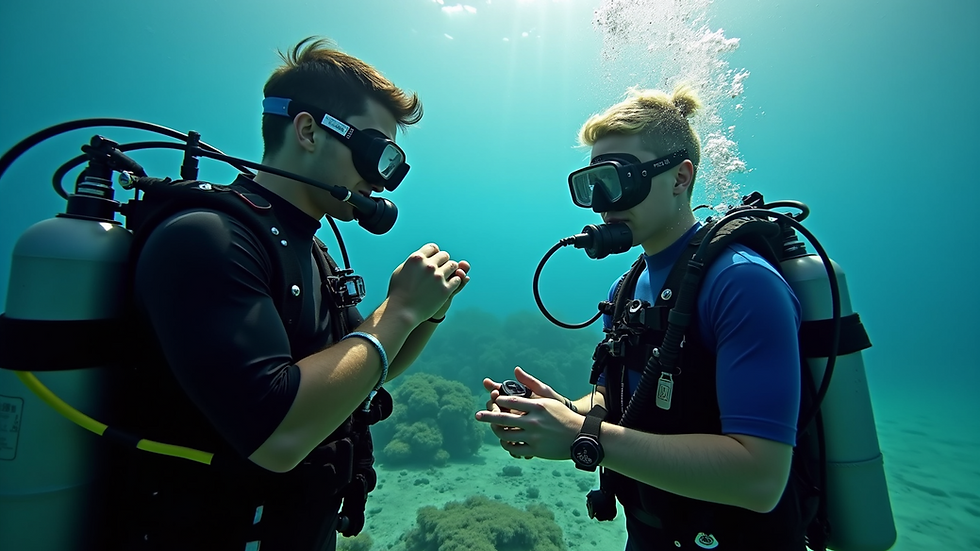What to Expect During a Nighttime Dive
- Karl

- Jun 11, 2025
- 4 min read
Nighttime dives offer a unique and exhilarating experience for divers, showcasing the underwater world in a completely different light. The tranquility of the ocean at night, paired with the spectacular array of marine life that comes out after dark, makes for an unforgettable adventure. Whether you are a seasoned diver or a beginner, a nighttime dive can be a thrilling experience that leads to memorable encounters beneath the waves. However, preparation is key. This blog will guide you through what to expect during a nighttime dive.
Understanding the Nighttime Dive
When diving at night, the environment changes dramatically. Unlike daytime diving where sunlight illuminates the water, a nighttime dive relies on artificial light sources. Divers typically use underwater flashlights or dive lights to illuminate their surroundings. As soon as you descend, the familiar sights of the daytime will seem distant, and a new world will unfold.
While it may seem intimidating, many divers find nighttime dives to be relaxing. The water becomes calm, and nighttime brings out a different kind of marine life. Creatures like octopuses, squids, and bioluminescent plankton are often observed, offering a spectacular experience.

The Gear You Need for Night Diving
Preparing for a nighttime dive means ensuring you have the right gear. Here’s a list of essential items you should consider:
Underwater flashlight: The most critical piece of equipment. Choose a sturdy, waterproof light that offers a strong beam to illuminate your surroundings.
Red filter: Some divers use a red filter for their lights to maintain night vision, allowing you to see while keeping the nocturnal environment unaffected.
Backup light: Always have a secondary light source in case your primary flashlight fails.
Surface marker buoy: This is essential for safety, especially when diving from a boat. It helps mark your position during the dive.
Dive computer or depth gauge: Monitoring your depth and time underwater is crucial, especially in low visibility conditions.
Make sure all your equipment is well-maintained and tested before the dive.
Safety Protocols for Night Diving
Safety is paramount during a nighttime dive. Before even entering the water, you should participate in a safety briefing with your dive group. Discuss the dive plan, signal communication, and how to monitor each other.
Buddy system: Always dive with a buddy. This is critical for safety, as you can assist each other in case of any issues.
Stay close: It’s easy to get separated in the dark. Stay close to your dive buddy to avoid losing each other.
Use consistent signals: Agree on hand signals for communication before entering the water, as sound can travel differently underwater.
During the dive, ensure you keep your flashlight pointed downwards to avoid disturbing marine life and also to maintain a good awareness of your surroundings.

Unique Marine Life Encounters
One of the most exciting aspects of a nighttime dive is the opportunity to witness different marine life behaviors. Many species of fish and other sea creatures exhibit unique behavior patterns at night.
Predatory species: Nighttime often brings predatory fish such as barracudas and snapper hunting for food.
Bioluminescent organisms: You may come across glowing plankton, which creates a magical effect in the water.
Invertebrates: Creatures like nudibranchs and octopuses are often more active, and the colors can seem even more vibrant under flashlight illumination.
Be prepared to take your time observing and appreciating the various life forms you encounter.
Preparing Yourself Mentally
Diving in the dark can be a psychological challenge for some. It's essential to mentally prepare yourself before entering the water.
Practice relaxation techniques: Breathing exercises can help calm nerves and reduce anxiety, ensuring a more enjoyable dive.
Focus on your dive plan: Having a structured plan helps manage distractions and anxiety. Concentrate on your objectives and what to look for during the dive.
Familiarizing yourself with the dive site beforehand can also alleviate anxiety. Knowing what to expect, from the depth to the types of marine organisms that inhabit the area, adds to your comfort level.
Embrace the Nighttime Dive Experience
After embarking on a nighttime dive, embrace the beauty and mystery of the underwater world. Each dive offers a unique experience, and as you descend, allow yourself to fully engage with the environment around you.
Trust your training, rely on your equipment, and connect with your buddy. Every moment in the water presents an opportunity to learn something new. Whether you’re observing bioluminescent plankton floating in patterns or spotting a delicate octopus hiding among the rocks, take the time to appreciate each detail.
As you immerse yourself in the tranquil beauty of the underwater night, you will discover that nighttime diving is not just about the dive; it’s about the journey of experiencing the ocean in a way many will never imagine.
Diving at night can feel different compared to daytime dives, but with the right preparation, you will find that it becomes a rewarding and thrilling adventure. If you’re curious about what it’s like to go scuba diving at night, consider planning your next dive to take place after the sun goes down.







Comments